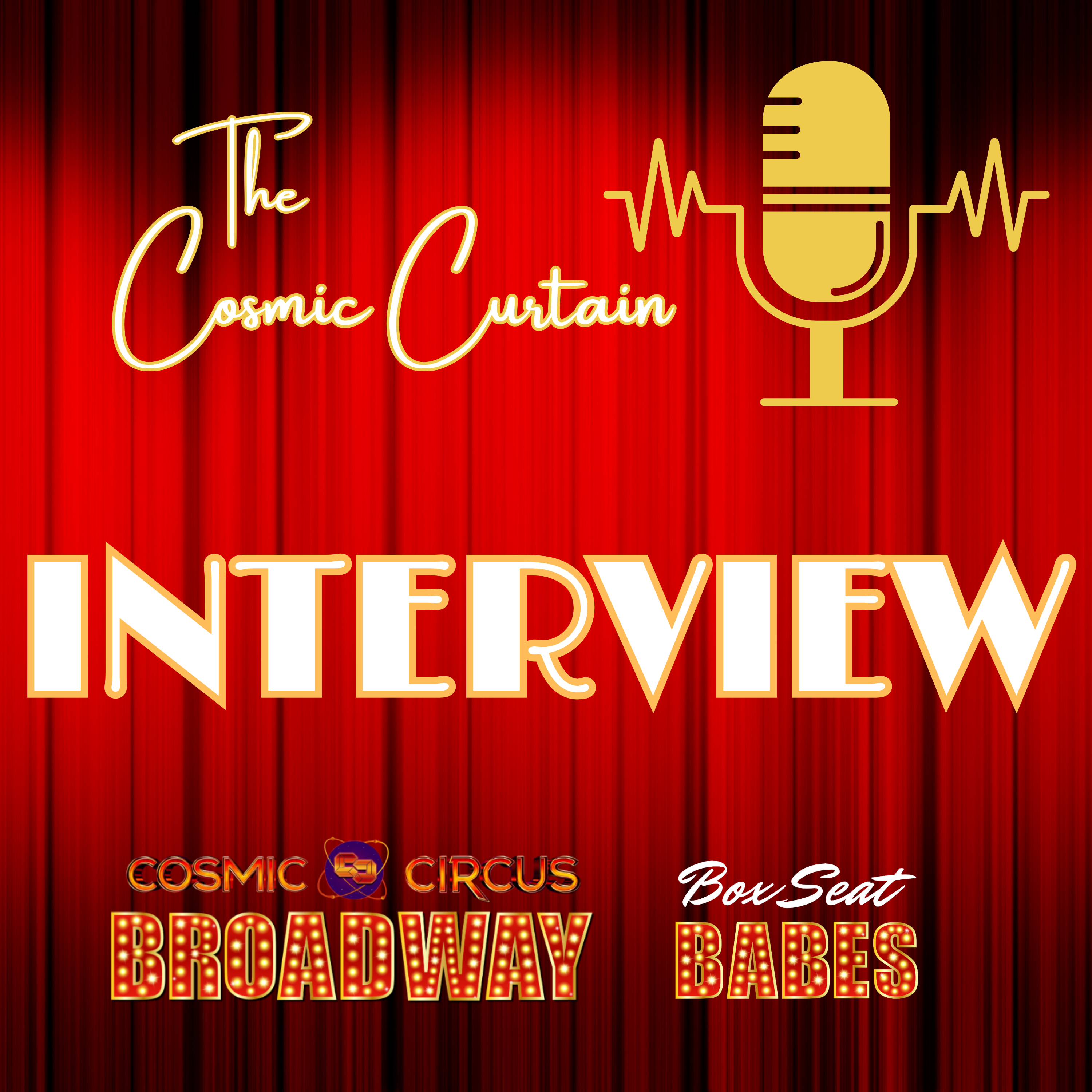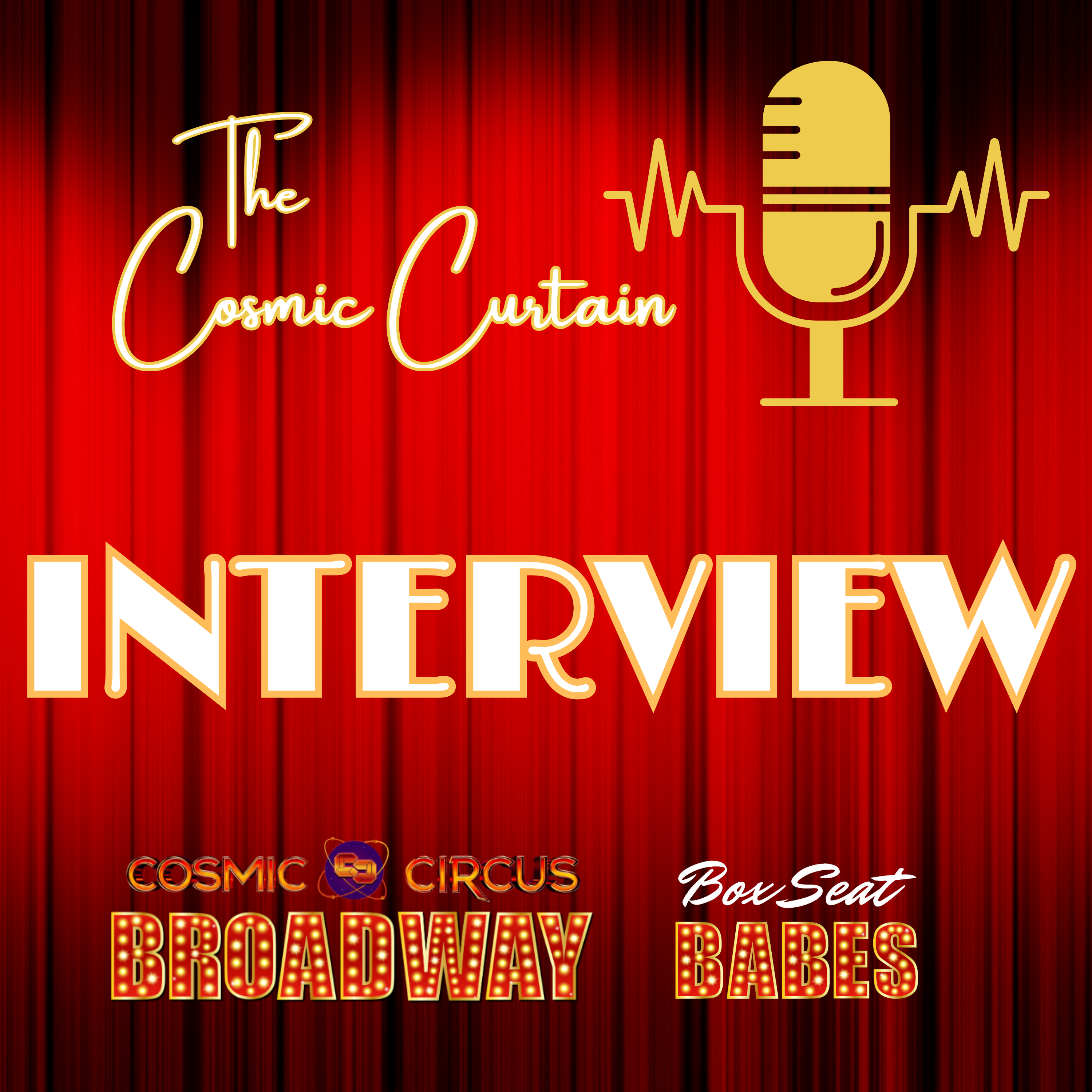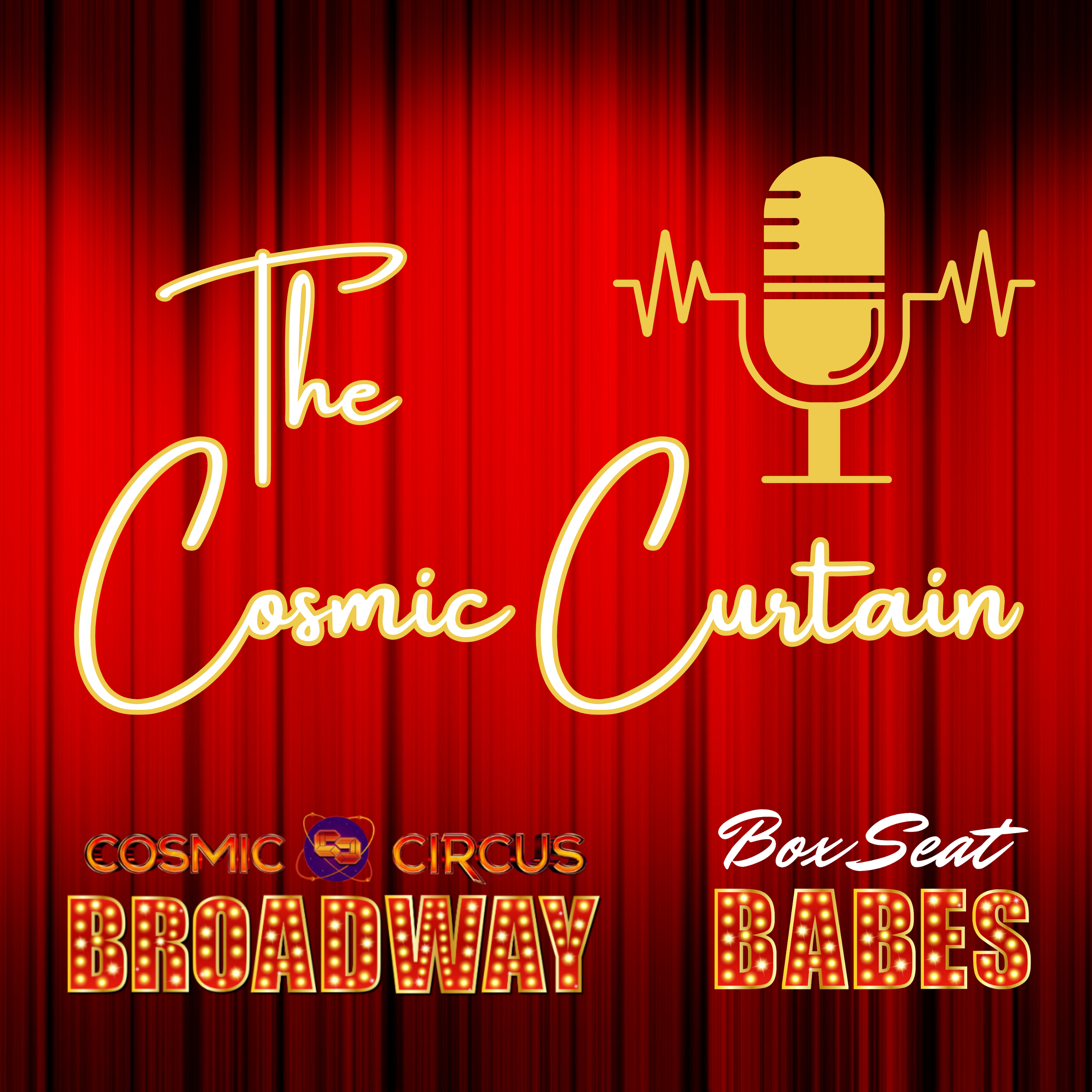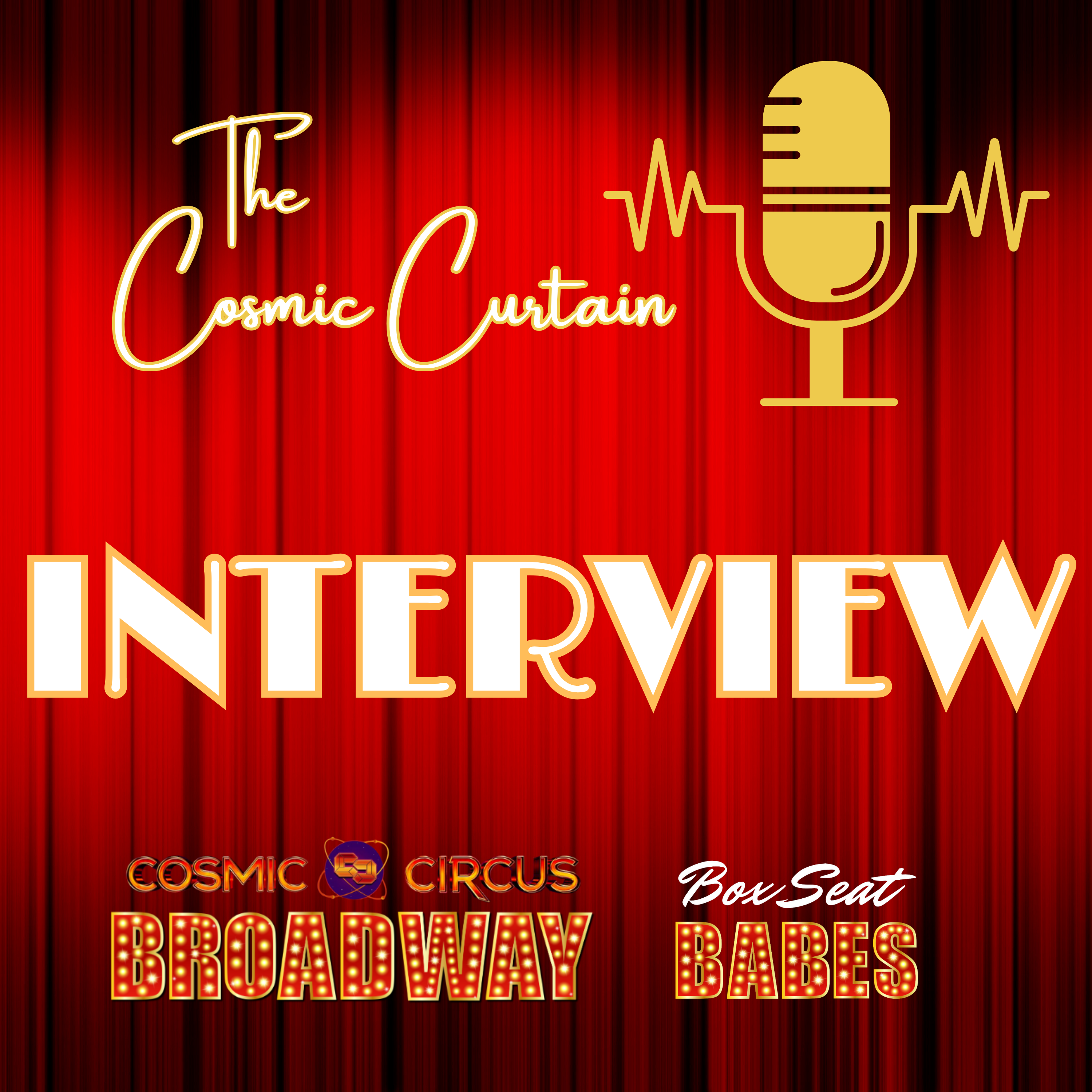Episode Transcript
[00:00:00] Speaker A: Welcome to the exclusive Cosmic curtain interview with Katherine Molchler. I'm Brian Kitson, head writer of the Cosmic Circus and the Cosmic Circus Broadway.
Katherine Molcher is starring in University of Detroit Mercy's production of Witch, which runs for six shows starting on October 25. In this interview, Mocheler speaks on her theater journey at U of D Mercy, how she's grown as an actor with her role in Witch and what she hopes audiences take away from this production. Enjoy. Thank you so much for joining us today.
[00:00:29] Speaker B: Thank you so much for having me.
[00:00:31] Speaker A: So you are currently in rehearsals for Witch at U of D Mercy. How is that going so far?
[00:00:38] Speaker B: It's going really well. This is a really, like, really juicy script. And I like, like, we're a few weeks into production and I'm still, like, gasping. Oh, my God. Like, through every rehearsal process, it's kind of interesting because a lot of the scenes, like, are smaller and only take place between, like, one or two people or, you know, three or four people. So our rehearsals are smaller than they usually are. The University of Detroit Mercy and our theater company in our productions. I'm going to turn off my email so you can't hear my notifications.
Yeah, so it's kind of scary, but also really cool and inspiring to, like, be working in really small groups and getting that, like, really, I don't know, direct feedback from your director.
But, yeah, we're really excited, especially about this script, and I think everybody's really passionate about it. So things are going good so far.
[00:01:31] Speaker A: So it sounds like it's a much different kind of rehearsal process. You know, it's much more intimate. You're getting into these deep diving in these scenes a little bit more.
[00:01:38] Speaker B: Yeah, yeah, for sure.
[00:01:40] Speaker A: That's fantastic. So can you tell us a little bit about the show for those of us who maybe don't know it and then what your role is in that?
[00:01:46] Speaker B: Yeah. So essentially the little, like, I don't know, the little blurb we give is the premise is that the devil has come to this little town. It takes place somewhere in the 16 hundreds. The devil has arrived in the town of Edmonton and is trying to, like, get people to sell their souls to him in exchange for their greatest wish. And so the devil is hearing from some of the townsfolk that there is a woman who might potentially be a witch in the town. Her name is Elizabeth. And so they're like, oh, you should go, like, go talk to the witch. She'll definitely sell you her soul. So it kind of surrounds all these people in town. Getting their wishes and what that means for their relationships with other characters. But it also primarily revolves around the devil trying to win the soul of this accused witch. I play Elizabeth Sawyer, who is the witch, or at least the accused witch. And, yeah, she's lived a life. You know, she's very much an outsider cast out amongst the town peop, the townspeople, they're very much afraid of her. I. And so to have, like, the devil kind of show up at her door is a very interesting dynamic for her and very. I don't know, it's very weird for her to get somebody. Somebody's attention to that level where, like, they want something from you. So very, very fun. Kind of subverts expectations, but it's fun.
[00:03:06] Speaker A: I'm very excited about that. My day job as a psychologist. So to kind of see the psychology of between. Of, like, being accused of something, but then also being offered that thing or being offered your biggest desire, what is that kind of do? So I feel like this is going to be really juicy of a role.
[00:03:22] Speaker B: Oh, yeah, it really is. It's fun and, yeah, very psychologically interesting. Lots of things going on in all of the characters. There are some pretty complicated and weird people and characters in this show, so it gives people lots to think about.
[00:03:39] Speaker A: So this is being described as a modern retelling of a jacobean drama. How do you feel like the show has been updated for this production?
[00:03:46] Speaker B: Yeah, one thing we're not doing is we're not talking funny and old, so you're not gonna hear us going like, thou art ye old? And things like that. Because this is based off of, like, I think, yeah, an old play or an old folktale or something like that. So we're not, like, if you're scared of, like, Shakespeare talk or if there's people who, like, feel, I don't know, put off by period pieces, very much modern speech and very accessible on that level.
[00:04:10] Speaker A: Sure.
[00:04:11] Speaker B: I would also say in terms of the stories that it's telling you, um, this play does have a queer storyline and a queer, like, love story ish kind of thing, which obviously is something you wouldn't see much of in, like, the 1620s, where this takes place. Um, and it's especially. It talks a lot about gender and gender dynamics, which obviously, like, the patriarchy was running, was up and running in the 1620s, in the 17th century. However, the way that the characters talk about it and look at it and the way that the audience is encouraged to think about gender and power is certainly, like, more. I don't know, it's more equipped for a modern audience to understand and be intrigued by.
[00:04:52] Speaker A: So it sounds like through a lot of these things, you're, you know, it's working to, like, de alienate people, to, like, make it more, like you said, more accessible and more. Exactly, intriguing to all audiences.
[00:05:03] Speaker B: Yeah, it brings, and I'm a history major, so, like, I'm not necessarily a theater student. And when people heard history, they tend to think, like, I don't get that, or that doesn't make sense to me. So this script is very much, like, meant for people to get excited about history, about this period and about this story and, like, the messages that it has to say.
[00:05:24] Speaker A: So why do you feel like maybe this feels like the right time to tell the story?
[00:05:28] Speaker B: Well, first of all, we open, like, the week before Halloween, so obviously, like, spooky autumn and the devil. That's just fun.
However, I do think that this is a really, again, I kind of talked about, it talks a lot about power and what that means, especially in a gendered way. And it talks about that in a way that I think is very nuanced. And we haven't really done a lot of in our productions here. And so I think if you're someone especially, like, in the past few years, like, if you feel kind of frustrated about, or maybe you're gaining consciousness about the way that, like, gender or your identity is affected and how people view you and your capabilities because of your identity, because I think that's something we've seen arisen in the past few years, just with all the craziness that goes on in the world, I think it will help you give a name and be able to voice frustrations that you have, that you've always known, that you've had. But maybe you've only been conscious of in the past few years because we're trying to be much more inclusive and much more conscious about the power dynamics that we construct in our societies. And it's spooky, and I love spooky season, so I'm excited.
[00:06:42] Speaker A: It is the perfect time to have, to have a play like this to come out, so.
But it's cool that it can speak to those things that many people are struggling with or many people are experiencing. And I think that this is definitely the, the right time for that kind of story.
[00:06:58] Speaker B: Yeah, I would agree.
[00:07:00] Speaker A: How do you feel like your character kind of evolves to the show? How do you like, as an actor? How do you evolve your character?
[00:07:07] Speaker B: Well, I kind of talked about it before. She's like, Elizabeth is an outsider. She's not used to people talking to her. Everyone in town is absolutely afraid of her because she's a witch or they think she's a witch. And so to have the devil kind of on your doorstep and is like, because he's using every tactic he can to win her soul, you know, kind of develops a. I don't know, a weird relationship with him where she opens up to him in a way that she doesn't really before. And that's kind of fun as an actor because, like, you have to work on a lot of stuff. Like, you have a physical evolution if you're going from a character who's very closed off and doesn't speak to becoming more comfortable speaking with another human being or supernatural being, I guess. And then, you know, vocally and emotionally. So there's a really big shift just in the way that Elizabeth carries herself and guards herself around other people. That shifts throughout, which is tricky to fine tune in rehearsals. But obviously, I have great cast members and a director to help me out and help fine tune those things and figure out how that arc develops and at what pace that arc develops. It's definitely a challenge.
[00:08:24] Speaker A: Do you feel like that has been your biggest challenge with this production or, like, how has this production besides that pushed you as an actor?
[00:08:31] Speaker B: Yeah, I would say that it's really this role because she is someone who is very still and very silent, but she has, like, I don't want to spoil the ending, but she has some really important things to say and a really important question to raise to the audience. But, like, how do you convey that message without relying on so much movement? Without relying on maybe some of the expressions and the fun that some of the other characters get to have.
It's a lot to tell in not a lot of space, if that makes sense. So I think, for me, it's just kind of making sure, like, do my choices as an actor read when I'm kind of constrained physically and vocally and, you know, how do you efficiently tell a story and efficiently get your message across without, I don't know, overacting or without doing something completely out of character?
[00:09:26] Speaker A: Absolutely.
So there's quite a lot of themes throughout this. You know, you've addressed some of them. Is there one that specifically resonates with you the most?
[00:09:35] Speaker B: I would say. I don't know if it's necessarily a theme, but I think a motif that kind of appears throughout the show is, like, having your voice heard and feeling like your voice is important.
I think I'm a senior this year. So I don't know. I'm about to enter the professional world in whatever endeavor.
And, you know, I think as a woman and as a woman in theater, I certainly harbor a lot of insecurities about my voice and the value of what I have to say and what I think. And I think, for me, like, I got emotional, almost like, reading the script for the first time because I was like, oh, my God, I, like, resonate with this character so much, and I hope that she will resonate with other people as well. But I think this feeling of, like, no, I do have things to say and feeling confident in the things that you have to say and the ideas that you have and not letting people, like, belittle you because of who they think you are or what you look like or how you sound. And I think, you know, graduating from the University of Detroit mercy and entering the. The professional world, the real world, with that confidence, like, in my voice and in who I am, I think is really important to me. So that, to me, is, like, the one that hits closest to home is just, like, you are worthy, you are valuable, and you should feel confident in who you are, even when there are overarching power dynamics working against you.
[00:11:01] Speaker A: So it sounds like this came at the right time in your life, too, entering into that real world and getting to have some of those, getting to kind of mimic and shadow some of those, that growth and the motifs and stuff like that.
[00:11:12] Speaker B: Oh, yeah, for sure.
[00:11:15] Speaker A: What has been a standout moment for you about your time on this production?
[00:11:19] Speaker B: There is. Okay, I don't know if this is a spoiler or not, but there is a fight scene. I won't say how the fight scene ends, and I'm not in the fight scene, but I. Oh, my God. We're just so excited because we've never really done, at least in the four years I've been here, we've never really done, like, a prolonged, like, choreographed fight scene. So there's two actors involved with that, Lee Udel and Jordan Collier. And the rest of us are just, like, so selfishly excited to watch them rehearse it and, like, put it together and, like, the few times that, like, we've all seen it run, like, we're just so excited. We're like, yes, fight scene. So maybe not as, like, poignant of a memory and a standout thing for me, but I'm really excited about the fight scene, and I hope that audiences are really excited about the fight scene because it's really cool and we get to work with an intimacy and fight coordinator, which is really important working in the industry. But on a college level, we don't deal with people like that very often. So we're very excited about the fight scene, and Lee and Jordan have been working really hard on it, and it looks cooler and cooler every time I see it, and I'm obsessed.
[00:12:28] Speaker A: I mean, you can't go wrong with a fight scene.
[00:12:30] Speaker B: You really can't. It's so exciting. There's plates are thrown. It's fun. It's very fun.
[00:12:36] Speaker A: Oh, that's gonna be awesome. I'm really excited to see that.
So being a senior at University of Detroit Mercy, and it sounds like you've been with the. Even though you're a history major, you've been with the theater department for a while, correct?
[00:12:50] Speaker B: Yes, that is correct.
[00:12:52] Speaker A: How has your experience been with the theater department and growing with that?
[00:12:56] Speaker B: I mean, I kind of joined the theater program accidentally. Okay. Like, my freshman year, coming into campus, I wasn't planning on doing theater in college, but I, you know, like most college freshmen, I was having a hard time, like, making friends, finding my people. So I just kind of, like, heard about auditions for the fall play on a whim, and I was like, well, I acted in high school. Like, let me just. Let me just try this out, see what's up. We were doing Antigone, which is like a greek tragedy, and I auditioned and got into the cast, so that was really shocking. So I was like, oh, wait. I didn't know this would be an opportunity for me. So I would say, really? So much of my, I don't know, growth in confidence, my friend group, I don't know, growing as an artist and an actor and as a person, I owe a lot to the theater company.
I think this will be my 7th or 8th mainstage show with the company, so I'm very passionate about the work that we do, and I'm extremely grateful for the memories that I've made and the things that I've learned, the opportunities and the characters I've gotten to play. I've done everything. I've been, like, trained in air guitar to british dialects, so I've learned a very diverse and fun range of skills working with the theater company. So it's kind of bittersweet, but I consider it a great privilege to be performing again, getting to do a show that's this exciting to me in my senior year.
[00:14:29] Speaker A: Do you see yourself continuing with acting outside of once you graduate?
[00:14:34] Speaker B: I hope so. I'm not necessarily sure how that's going to factor in, because I'm definitely someone I like to keep my options open.
[00:14:41] Speaker A: Sure.
[00:14:42] Speaker B: I don't believe in being too narrow minded when you're trying to plan out your life. And I just love storytelling in any capacity. Like, that's why I love history. I think history is interesting. I love museums. I love theater. And so I don't necessarily know professionally exactly how acting fits into that, but I know that I'm going to continue telling stories and working with people to tell stories in whatever capacity that is in, you know, it could be on a stage, in a museum, in a book or all, you know.
[00:15:14] Speaker A: Sure.
[00:15:15] Speaker B: I just want to make art and tell stories.
[00:15:18] Speaker A: Do you have a dream role, though, that you're like, oh, if I could play this role, this is the one I'd go for.
[00:15:23] Speaker B: Okay. Okay.
This is my history nerd showing. I love the musical 1776. In my opinion, 1776 does Hamilton way better than Hamilton does Hamilton. I would love to be John Adams in 1776, but obviously, you need a very big cast to do that. And traditionally, a role played by a man. But that, to me, would be the perfect combination of history acting.
There's a lot of yelling and. Yeah. And I also love yelling on stage. So that's my very nerdy answer to your question.
[00:16:02] Speaker A: I love that I've asked so many people that question. It's always like, alphaba or it's like, you know, I want to play, you know, satine, you know, but it's never like, that's a great one. That's a. That speaks to who you are as a person.
[00:16:16] Speaker B: I'm always in every. Because no one else in the department has ever seen it, or, like, they only know it through me or, like, my classmates. So, like, in every, like, class project, when we have to pick a play, I always pick 1776. I'm trying to, like, I don't know, plug it to. To my classmates. Like, please watch this, guys.
[00:16:36] Speaker A: I have never seen it, but I'm gonna have to now, because you do.
[00:16:39] Speaker B: You do. I don't. I. No, I'm not gonna get sidetracked. But I think it does what Hamilton is trying to do better than Hamilton does it.
[00:16:47] Speaker A: Those are big words, and I think some people would argue those are fighting words.
[00:16:51] Speaker B: They are. And I also love Hamilton, but, yeah, because that's also, like, theater history, right?
[00:16:57] Speaker A: Yeah, it's right up your alley.
[00:16:58] Speaker B: 1776. This is my official plug for the 1776 musical.
[00:17:03] Speaker A: I mean, there's. History is such a big thing right now with theater as well. We have six, which is fantastic, you know, so maybe it's time for a 1776 revival.
[00:17:12] Speaker B: Exactly. Yes.
[00:17:15] Speaker A: So final question for you is just what are you hoping audiences take away from? Which, like, what do you want them to leave kind of percolating in their minds?
[00:17:22] Speaker B: Mm hmm. Hopefully, that's my nonverbal answer to your question. Hopefully. Just like a, whoa, what on earth just happened? Because there are many twists and turns, and it will end in a completely different place than it started. But again, I think there are so many different themes. I kind of talked about the ones that resonate with me, but there are so many themes of, like, you know, belonging, power, desire, hope. And there are just so many things for people to latch onto. So maybe it's not necessarily one thing that I'm hoping that audiences take away, but I'm more so hoping that we can set up an environment that people feel invited to kind of step into and that kind of challenges people to think about something differently, whether it is, like, how much you want something and how far you would go to get it versus, I don't know, how people treat you versus how you wished people treated you. I don't know. I think I just hope that people kind of get maybe challenged or inspired to think about something a little differently in the realm of themes, which is probably not a great answer and a little vague, but there is just so much going on that I really think that there will be something for everyone to latch onto, and it might be different than the person sitting next to you, but, like, totally valid takeaway. Totally whatever, because it is a very, like, we are talking about some pretty personal things like hope and desire and despair and, I don't know, insecurity. So I think just in the way that that varies from character to character, I think it'll vary audience member to audience member. So I just hope that people come in with an open heart and leave with maybe some new ways of thinking about things.
[00:19:06] Speaker A: I love that. So you're only going to have six shows, which is running from October 25 through November 3.
I hope that. I'm excited to see it, and I hope that it's just as magical for you as it is for the audience.
[00:19:21] Speaker B: So I do, too.
[00:19:24] Speaker A: Thank you so much for being on here, and we'll see you soon. Okay.
[00:19:27] Speaker B: Yeah. Thank you. This was fun.



